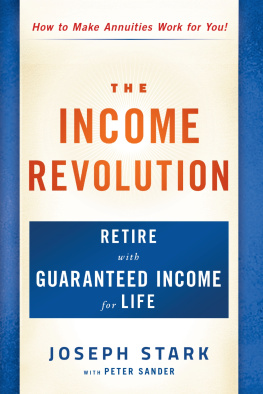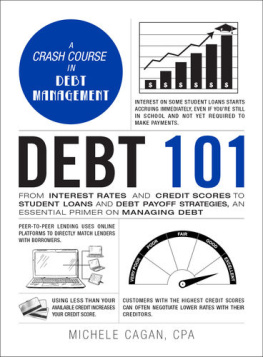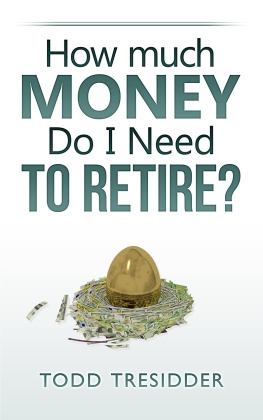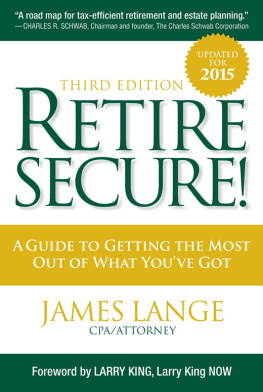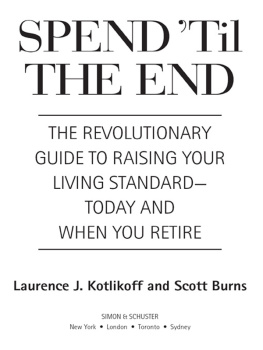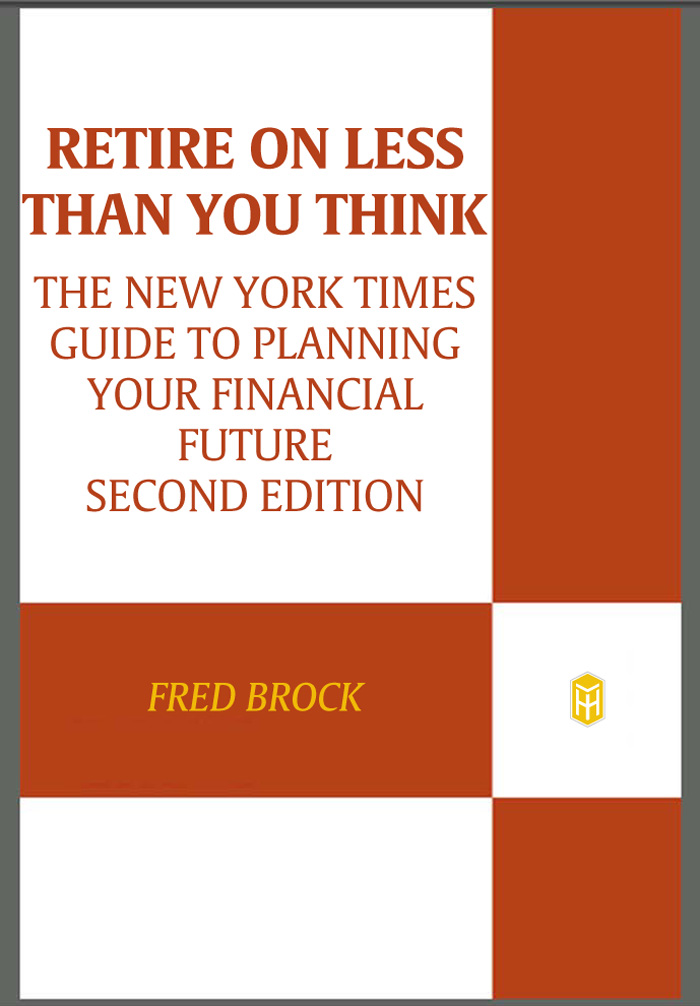ALSO BY FRED BROCK
Health Care on Less Than You Think:
The New York Times Guide to Getting Affordable Coverage
Live Well on Less Than You Think:
The New York Times Guide to Achieving Your Financial Freedom
Retire on Less Than You Think
Retire on Less
Than You Think

The New York Times
GUIDE TO PLANNING
YOUR FINANCIAL FUTURE
SECOND EDITION
FRED BROCK
TIMES BOOKS
HENRY HOLT AND COMPANY | NEW YORK

Times Books
Henry Holt and Company, LLC
Publishers since 1866
175 Fifth Avenue
New York, New York 10010
www.henryholt.com
Henry Holt is a registered trademark of
Henry Holt and Company, LLC.
Copyright 2004 by The New York Times Company, 2008 by Fred Brock
All rights reserved.
Distributed in Canada by H. B. Fenn and Company Ltd.
Library of Congress Cataloging-in-Publication Data
Brock, Fred.
Retire on less than you think : the New York times guide to planning your financial future / Fred Brock. 2nd ed.
p. cm.
Includes bibliographical references and index.
ISBN-13: 978-0-8050-8730-7
ISBN-10: 0-8050-8730-3
1. Finance, PersonalUnited States. 2. RetirementUnited StatesPlanning. I. New York times. II. Title.
HG179.B7438 2008
332.024'010dc22 | 2007040161 |
Henry Holt books are available for special promotions, and
premiums. For details contact: Director, Special Markets.
First Edition 2004
Second Edition 2008
Designed by Kelly S. Too
Illustrations designed by Pat Lyons
Printed in the United States of America
10 9 8 7 6 5 4 3 2 1
contents
preface
Since the first edition of this book was published in 2004, my life has changed considerably. Its as though I unconsciously wrote about my own future. Later that year, I took early retirement from the New York Times, and my wife and I moved to Kansas where I took a teaching post at Kansas State University. Although I did not retire, many of the dynamics of the movewhich are explained in were the same. I ended up proving by my own example that you can retire on less than you think, especially if you are willing to relocate to a less expensive area of the country. We even generated enough money to buy a second, small home in southern Arizona, where we vacation and plan to eventually retire, whatever that may come to mean.
Like its predecessor, this book is an outgrowth of the Seniority column I wrote for nearly six years for the New York Times Sunday Money & Business section. Writing the column and the two editions of the book has been an engaging process of learning and discovery, the results of which I hope will help people focus more clearly on some of the big issues they will face as they plan their retirements. For most of us, the main question is Can I afford to retire? On this central question there is an incredible disconnect between the everyday reality of how much it takes to live in retirement and how much money Wall Street and the mutual fund industry tell us we need. Unfortunately, much of the media have blithely accepted the inflated projections of financial services industry experts. This misinformation has created a lot of needless worry for many people, sometimes causing them to delay retiring. I hope this book will serve as a balance to these self-serving projections and help people realize that retirement, however they define it, is not just a dream.
This book is intended neither as an investment guide nor as a self-improvement guideexcept in the sense that your personal situation might be improved by retiring.
When calculating future earnings on savings, I have usually used a rate of 6.5 percent. I selected it because it seemed a middle ground between those optimists who see future stock returns of 12 to 15 percent and the doomsayers who see 2 percent or less. Also, many very sober economists foresee market returns of 5 to 7 percent over the next decade or so. With online calculators, readers can easily substitute their own rate.
Because of the lag time in book publishing, some figures cited may be slightly out of date. But in most cases its the relative differences between sets of figures that are important; they will likely remain constant.
All the people described in these pages are realwith one exception. James McCain is not the actual name of the retired professor in . He requested that I not use his name or other details that would identify him, in order to protect his privacy. I agreed because, ultimately, his story is more compelling than who he is. Everything else about him, including his personal financial information, is accurate.
I am grateful to the many people who helped me with this book and who were willing to discuss their personal finances. I would especially like to thank Bill and Donna Taaffe.
I would also like to thank my talented editor, Robin Dennis; my always supportive agent, Alice Martell; the New York Timess Pat Lyons, who has created the graphics for all my books; and my colleagues at the A.Q. Miller School of Journalism and Mass Communications at Kansas State University and Angela Powers, its director, who have always been kind and helpful.
I will always be grateful to my wife, Evelyn, whose adviceeditorial and otherwiseis usually on target.
Finally, thanks to Elton Pasea, the happiest guy in Texas, whom you will meet in . He continues to show the way.
Retire on Less Than You Think
1
Do You Really Want to Retire?
In the twentieth century, we gained an additional thirty years of life.
It took the preceding fifty centuries to do that. Thats extraordinary.
ROBERT N. BUTLER, M.D., PRESIDENT,
INTERNATIONAL LONGEVITY CENTERUSA
The basic idea behind this book is simple and straightforward: you can retire sooner and on less money than you think, and live quite well, if you are willing to make a few relatively painless lifestyle changes.
Various polls in recent years by AARP, the Employee Benefit Research Institute, and USA Today have shown that some 60 percent of working Americans dream of early retirement. Yet every time there is some jarring economic newsdeclining stock prices or a slump in the housing marketmany people feel they must postpone retirement as they contemplate their shrinking investments and how much money they still need to save.
This is a book for those dreamers who want to retire sooner rather than later but are afraid they cant afford it: people who yearn for the time to realize a lifelong dream or avocation; people who have reached a dead end in their careers or who are burned out after years of doing the same thing and want to move on; or people who simply want a change. It is also for those who are at or past the traditional retirement age of sixty-five but continue to work because they are convinced they dont have enough money to retire.
Also, of course, it is for those who suddenly find themselves involuntarily retiring early because of employer cutbacks. Such forced retirements usually involve so-called incentive packages that may include a lump-sum payment or extra years credited to your retirement accountor both. Many forced retirees are equally apprehensive, perhaps even more so, about whether they can afford retirement.


